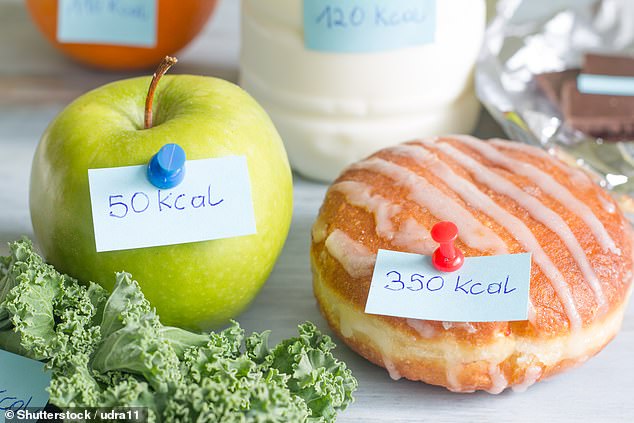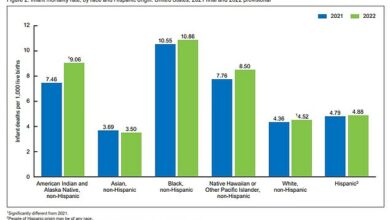I’m an NHS Dietitian – Here’s What I Do to Avoid Gaining Weight







Lucy Diamond, Registered Dietitian and Clinical Director of Innovation at NHS weight management provider Oviva
Like many others, your goal may be to get slimmer, more toned, and beach-ready this summer.
But losing a few pounds shouldn’t just be about “quick fixes or extreme, fad diets”, warns Lucy Diamond, a registered dietitian and clinical director of innovation at Oviva, a supplier of NHS weight management products.
Maintaining a healthy weight isn’t just important for aesthetic reasons. It also improves your overall well-being and can help prevent several health conditions, including heart disease, type 2 diabetes, and certain cancers.
Avoiding refined sugar and avoiding fatty fast foods are obvious ways to shed a few pounds.
But making other dietary changes to create fiber- and protein-rich meals can also help make your weight loss goals more attainable, Ms. Diamond says.
Reduce the amount of calories, but make sure it is rich in nutrients…
A balanced diet with plenty of fruits, vegetables, and protein-rich foods will help you achieve your weight loss goals.
But you do need to make sure you keep a close eye on how many total calories you eat in relation to your calorie expenditure.
That’s because a “calorie deficit,” where you consume fewer calories than your body needs to maintain your current weight, is essential for losing a few pounds.
“This can be achieved by reducing calorie intake through dietary changes, increasing physical activity, or a combination of both,” Ms Diamond explains.

Dietitians say you should make sure you keep track of how many calories you eat compared to your calorie output.
When you are in a calorie deficit, your body begins to use stored fat for energy, resulting in weight loss.
But if you take calorie restriction too far, it can lead to health problems, such as a slowed metabolism and nutritional deficiencies.
Ms Diamond says: ‘It’s important to approach a calorie deficit in a healthy and sustainable way, ensuring you still get enough nutrients to support your overall health and wellbeing.
‘Extreme calorie restriction can lead to nutrient deficiencies, slowed metabolism, and other health problems. It is therefore advisable to aim for a moderate deficit and incorporate a balanced diet and regular exercise into your routine.’
Rather than restricting food intake completely, Ms. Diamond recommends eating “nutrient-dense” foods, which are high in vitamins and minerals, rather than “empty calories” like candy.
She says, “This doesn’t mean you should count calories, but you should approach it from the standpoint of maximizing the nutritional value of what you eat, rather than empty calories.”
Sustainable food exchange products contain a lot of fiber and protein…
If you are in a calorie deficit, it is important to make sure you eat snacks that are high in fiber and protein rather than carbohydrate-rich foods. This will help you feel “full” and satisfied for longer, Ms. Diamond said.
She suggests snacking on hard-boiled eggs, apple slices with a little nut butter, or some hummus and carrots.
For healthy meals, she recommends a quinoa salad with vegetables and chickpeas, a chicken and vegetable stir-fry, a lentil chili, or grilled salmon with sweet potatoes and steamed broccoli.
Ms Diamond says: ‘These foods not only provide important nutrients, but also help keep you feeling full and reduce cravings for unhealthy snacks.’
But if you want to lose weight, it’s important to be mindful of portion sizes and the composition of your plate, Ms. Diamond warns.
To make sure you’re not overindulging, she recommends using the “T-plate model,” where your plate is a quarter carbs, a quarter protein, and half vegetables.
If you’re craving something sweet, Ms. Diamond advises skipping cake or ice cream for dessert and opting for Greek yogurt with berries instead.
This will help you avoid sugary and processed foods, which can contribute to weight gain and higher blood sugar levels, she says.

Eating hard-boiled eggs, apple slices with a little nut butter, or some hummus and carrots will help you stay fuller and fuller for longer, says Ms. Diamond.
“Choose whole, unprocessed foods whenever possible and read product labels to stay on top of hidden sugars and unhealthy additives,” says Diamond.
‘Minimize sugar and maximize fiber, this will promote satiety. Feeling fuller for longer can help with weight loss and maintenance and can curb sugar cravings.’
Staying hydrated also plays an important role in weight management.
However, she warns that this does not apply to sugar-free lemonade, tea or coffee with a dash of milk, as these contain sugars.
‘Drinking water before meals can reduce hunger and prevent overeating. In addition, water supports metabolism and the efficient functioning of body systems,’ she added.
Put your phone away and avoid distractions…
Eating more slowly and paying more attention to what you eat can also help you eat less.
According to Ms. Diamond, mindful eating helps you recognize physical hunger and fullness signals.
To achieve this, she advises turning off the television and putting away your smartphone during meals. This prevents you from mindlessly scrolling and therefore mindlessly eating.
She also recommends that people chew slowly and savor each bite, which will help them enjoy their food more and reduce their overall intake.
“Many people don’t eat mindfully, regardless of their weight. But mindful eating makes us more aware of how much we eat and can change our relationship with food,” Diamond said.

Turning off the TV and putting away your smartphone to avoid mindless scrolling can help prevent overeating.
Make sure you get a full eight hours of sleep each night….
Getting enough sleep is also essential for maintaining a healthy weight.
That’s partly because sleep deprivation can disrupt the hormones that regulate hunger, which can lead to increased appetite and weight gain.
Chronic stress can lead to emotional eating and unhealthy food choices.
Everyone has different needs, but Ms. Diamond advises most of us to aim for 7-9 hours of sleep per night.
She also recommends incorporating stress-reducing exercises, such as meditation, yoga or breathing exercises, into their routine.
“Practicing these strategies will not only facilitate healthy weight loss, but will also promote overall well-being. Remember, the goal is to create a lifestyle that is enjoyable, sustainable, and supportive of long-term health,” Ms. Diamond said.
“If you are concerned about your weight or risk of weight-related health problems, see your doctor or other medical professional.”





